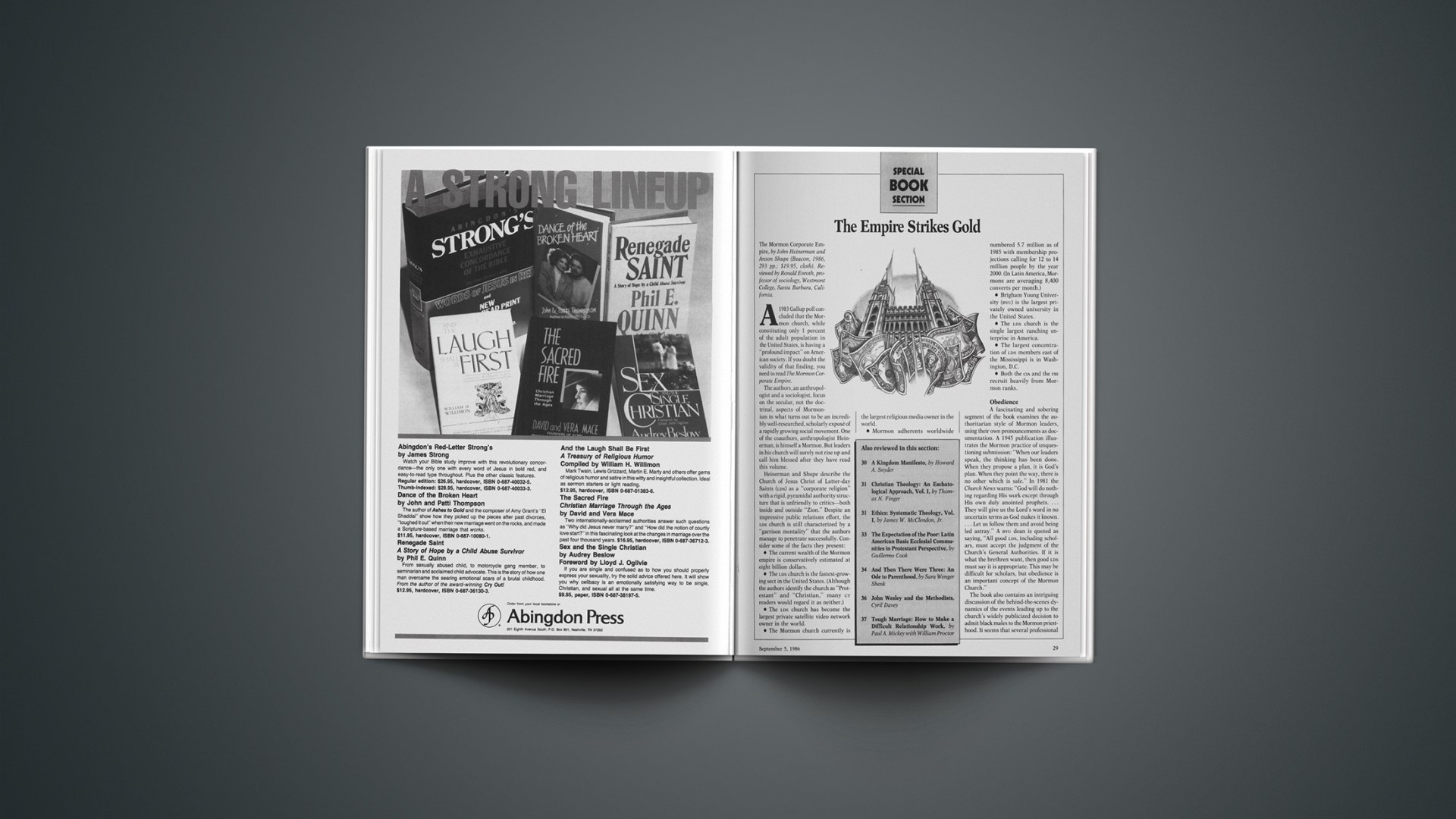The Mormon Corporate Empire, by John Heinerman and Anson Shupe (Beacon, 1986, 293 pp.; $19.95, cloth). Reviewed by Ronald Enroth, professor of sociology, Westmont College, Santa Barbara, California.
A 1983 Gallup poll concluded that the Mormon church, while constituting only 1 percent of the adult population in the United States, is having a “profound impact” on American society. If you doubt the validity of that finding, you need to read The Mormon Corporate Empire.
The authors, an anthropologist and a sociologist, focus on the secular, not the doctrinal, aspects of Mormonism in what turns out to be an incredibly well-researched, scholarly expose of a rapidly growing social movement. One of the coauthors, anthropologist Heinerman, is himself a Mormon. But leaders in his church will surely not rise up and call him blessed after they have read this volume.
Heinerman and Shupe describe the Church of Jesus Christ of Latter-day Saints (LDS) as a “corporate religion” with a rigid, pyramidal authority structure that is unfriendly to critics—both inside and outside “Zion.” Despite an impressive public relations effort, the LDS church is still characterized by a “garrison mentality” that the authors manage to penetrate successfully. Consider some of the facts they present:
• The current wealth of the Mormon empire is conservatively estimated at eight billion dollars.
• The LDS church is the fastest-growing sect in the United States. (Although the authors identify the church as “Protestant” and “Christian,” many CT readers would regard it as neither.)
• The LDS church has become the largest private satellite video network owner in the world.
• The Mormon church currently is the largest religious media owner in the world.
• Mormon adherents worldwide numbered 5.7 million as of 1985 with membership projections calling for 12 to 14 million people by the year 2000. (In Latin America, Mormons are averaging 8,400 converts per month.)
• Brigham Young University (BYU) is the largest privately owned university in the United States.
• The LDS church is the single largest ranching enterprise in America.
• The largest concentration of LDS members east of the Mississippi is in Washington, D.C.
• Both the CIA and the FBI recruit heavily from Mormon ranks.
Obedience
A fascinating and sobering segment of the book examines the authoritarian style of Mormon leaders, using their own pronouncements as documentation. A 1945 publication illustrates the Mormon practice of unquestioning submission: “When our leaders speak, the thinking has been done. When they propose a plan, it is God’s plan. When they point the way, there is no other which is safe.” In 1981 the Church News warns: “God will do nothing regarding His work except through His own duly anointed prophets.… They will give us the Lord’s word in no uncertain terms as God makes it known.… Let us follow them and avoid being led astray.” A BYU dean is quoted as saying, “All good LDS, including scholars, must accept the judgment of the Church’s General Authorities. If it is what the brethren want, then good LDS must say it is appropriate. This may be difficult for scholars, but obedience is an important concept of the Mormon Church.”
The book also contains an intriguing discussion of the behind-the-scenes dynamics of the events leading up to the church’s widely publicized decision to admit black males to the Mormon priesthood. It seems that several professional consulting firms had been actively recommending certain policy changes to the church hierarchy just before the announcement of former President Kimball’s divine “revelation.”
An Excerpt
Liquid Assets
“Gone are many of the Church’s heavier investments in a number of eastern industrials such as U.S. Steel, Union Carbide, Ford Motor Company, General Motors, and Chrysler. One financial planning officer for E. F. Hutton (and an active Mormon) commented, ‘I was astonished at just how much of their entire investment portfolio has changed in such a short period of time. The average turn around in their portfolio investments was unbelievable.’ He estimated that in recent years well over 80 percent of the LDS Church’s stocks and bonds investments have been made or readjusted to fit into the new liquidity strategy.”
Annihilation Of America
More disturbing, however, is the authors’ contention that the LDS church is kingdom-bent on a crusade to undermine religious pluralism, influence the contours of economic power, and reshape the status quo of the American political system. For what it’s worth, the authors point out that the Reagan administration has employed more Mormons than any other administration. And they remind us that the eschatological theme of the annihilation of America and its eventual dependence on the LDS church is still popular among contemporary Mormons.
In the preface to their book, Heinerman and Shupe acknowledge that what they have to say is certain to be controversial. In language that is atypical of most social scientists, they assert: “If controversy arises over our interpretation of the vast wealth and secular ambitions of the Mormons, let it rage.”
The information they present is convincing and uncomfortable. “Disproportionate Mormon influence in government and economic institutions,” the authors conclude, “wielded in the post-millennial cause of theocracy, is no fiction. The data presented here are real, can be independently confirmed, and must be faced.”










